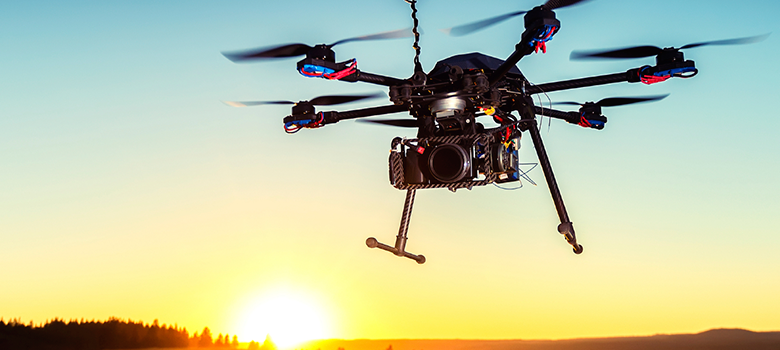
Drones, or unmanned aerial vehicles (UAVs), are playing an increasingly large role in businesses and private security in the United States.
Recently proposed FAA rules will clear the way for a number of companies including real estate, police, photographers and others to obtain an official operator’s license for their drone-related activities.[1]
Operators will need to demonstrate proficiency with a written test and pay a fee of $200 to obtain their license and register their drone. As with any job or industry that requires licensure, it seems feasible that “professional drone operator’ will quickly become a recognized profession across industries dependent on drone services.
The FAA has estimated that more than 7,000 businesses will take advantage of the licensing once it becomes available in 2017 or 2018.
The benefit of sky-high vantage points have already gotten a lot of notice as the price of drones have become cheaper. A good starting-level, camera-carrying drone can retail for as little as $200 and anyone with fairly good remote control skills can have their new drone up and running smoothly in an hour.
Companies offering professional drone services exist today and are growing. These companies provide security surveillance for private companies, utilities and sporting events among other services.
The cost of drone services varies widely – an hour or two can cost anywhere from $75 to $400. Agencies supplying drone operator services typically own their own drones and offer single or multiple drone coverage at your business or event.
Drone services today are largely dedicated to photography and surveillance, but trend-watchers have speculated about things like package delivery happening in the near future. However, parts of the FAA’s newly proposed rules put a damper on those plans with restrictions that prohibit drones from flying out of eyesight of their operators, and from flying over bystanders not directly involved in their operation. Although specific drone-related FAA rules are still pending approval, an FAA advisory on “Model Aircraft Operating Standards‘ is largely recommend and cited among drone enthusiasts.
The involvement of drones in breaches of prison security and harassment of celebrities has prompted a crop of software, hardware and agencies that provide drone defense services. Drones have also been used to scope out homes being targeted for robberies.
Documented smuggling operations using drone models that cost from $400 to $1200 have been documented in many U.S. counties and Canada, as well as globally. Low cost and a short ramp-up time for new operators offer a low barrier to entry for smugglers hoping to get materials into jails.
Software and hardware combinations, such as Drone Shield, offer a passive protection model by sending SMS alerts or other alerts upon detection of a drone in a protected space. Once the alert is received it is still up to the respondents on the ground to take any physical protective measures.
Lawmakers are trying to get the word out that the use of drones in crimes won’t be tolerated. Legislation has been introduced that would add an extra year of prison time for any crime that employed a drone. It won’t be known for some time if this penalty is stiff enough to overshadow the large payoffs for crimes like smuggling contraband into prisons.
Due to all of the interest drones have been receiving, there are now formal learning opportunities for people interested in pursuing drone servicing and operation as a career. Several programs exist that teach students about operational safety, FAA rules and regulations, as well as drone maintenance and service.
Salaries for drone pilots range from $50,000 to $120,000 per year. Colleges that offer drone operation courses, such as Northwestern Michigan College, are seeing a great deal of interest in these programs. Northwestern Michigan is expanding its UAV program to meet demand, and Northland Community and Technical College in Minnesota won a multi-million dollar federal grant that enabled them to start their formal drone operator education program.
Drone education doesn’t stop at operation and mechanics; the need for data analysis of the large quantities of data that drone surveillance produces also offers many job opportunities for interested students.
In tech-saturated areas, such as San Francisco, many private companies offer single or multi-day drone operation training for individuals looking to try out a new occupation or hobby as a drone operator.
Advances in drone technology combined with inexpensive entry-level drone models have created vast business opportunities for photography, surveillance, training, security and drone detection. As drone technology develops further, and more drone operators emerge, the opportunities and demand for drone-related job and businesses will increase. Capturing this demand will require up-to-date drone intelligence and the ability to adapt quickly to new needs for that sky-high perspective that drones provide.
See Also
- C. Whitlock, "FAA rules might allow thousands of business drones, The Washington Post, 15 February 2015. [Online]. Available: https://www.washingtonpost.com/world/national-security/faa-releases-proposed-rules-for-domestic-drone-use/2015/02/15/6787bdce-b51b-11e4-a200-c008a01a6692_story.html
- E. Hinson, Drones: a new favorite courier for smugglers, CBS News Online, 19 February 2015. [Online]. Available:https://www.cbsnews.com/news/drones-smugglers-newest-way-prison/
- T. Kingkade, Colleges Offer Courses And Training For Flying Unmanned Drones, The Huffington Post. [Online]. Available: https://www.huffingtonpost.com/2012/03/28/colleges-offer-drone-classes_n_1386500.html
Carol Glennon develops technical solutions using agile methodology with engineers and product stakeholders. She is a scrum master and a Stanford Certified Technical Project Manager. She is a member of IEEE-USA’s Communications Committee, where she serves as Social Media and E-Books editor.
Opinions expressed are those of the author and not necessarily those of IEEE-USA or IEEE.






